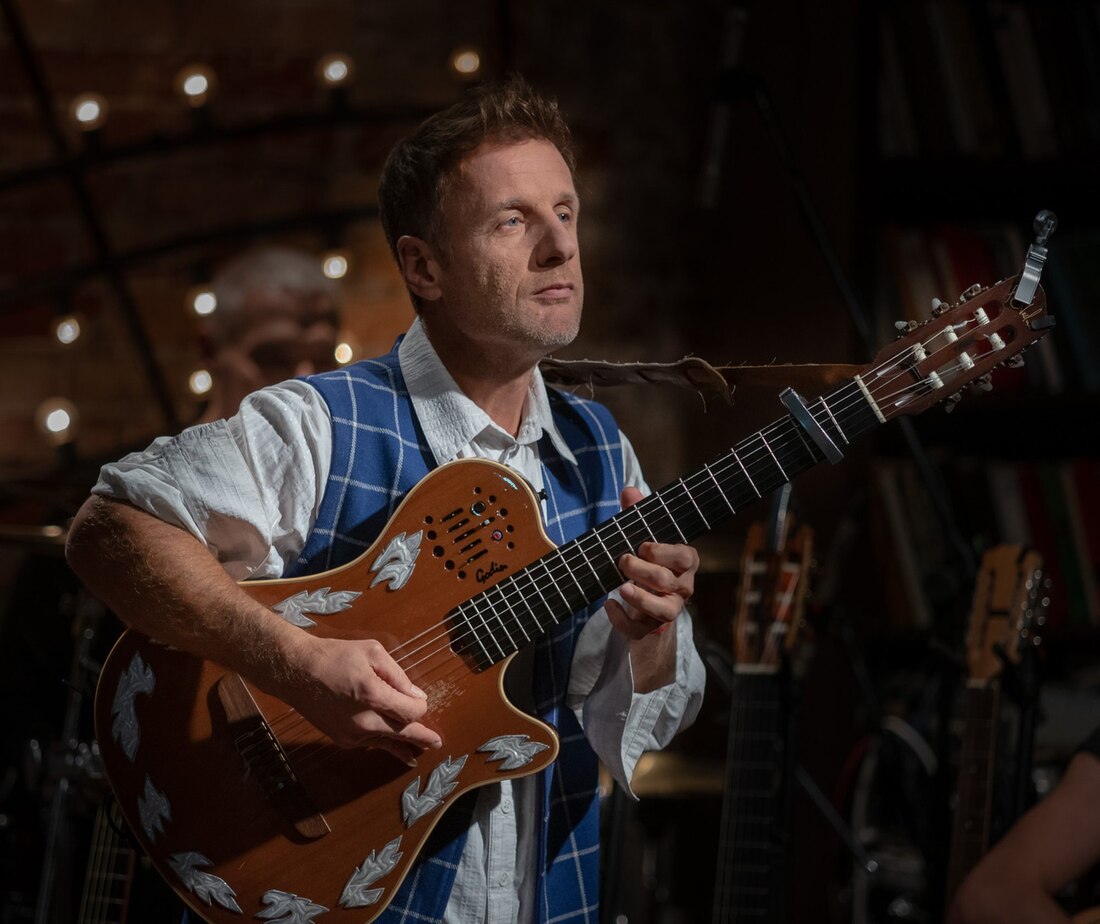Top Qs
Timeline
Chat
Perspective
Valery Mikhailovich Didula
Musical artist From Wikipedia, the free encyclopedia
Remove ads
Valery Mikhailovich Didula (Belarusian: Валерый Міхайлавіч Дзідзюля, romanized: Valiery Mikhaylavich Dzidziulia; born 24 January 1970) is a Soviet and Belarusian guitar virtuoso, composer, arranger, music producer, leader of the DiDuLa band.[1][2] Performs folk and fusion music with a new age influence.
This article may have been created or edited in return for undisclosed payments, a violation of Wikipedia's terms of use. It may require cleanup to comply with Wikipedia's content policies, particularly neutral point of view. (March 2021) |
Remove ads
Biography
Didula[3] was born in a family of music lovers. The first guitar was given to him by his mother at the age of five.[1] He began to practice and quickly mastered it. At sixteen he wrote his first compositions.[4] He later got a job as a third guitar ensemble "Scarlet Dawns" led by Nikolai Khitrik. Concerts were held in different cities, collective farms and state farms, and then in restaurants. After graduation school, he entered the radio engineering school[5]
Remove ads
Confirmation of his style
After the collapse of the ensemble, Didula took up sound engineering in the Grodno song and dance ensemble “White Dew”, where mostly Polish, Belarusian, Ukrainian, gypsy folk dances and motifs played, sang and danced.[6] As part of this team, Didula first went on tour in Europe - in Spain, Italy, Poland, Switzerland, France, Germany.[1][6] In Spain, he became acquainted with the flamenco style - the traditional Spanish music and dance style, which influenced its final formation (Didula's work traces some passages and rhythms characteristic of flamenco and other Spanish movements, but you can't call this music 100% flamenco).[6] He claims to have been "infected" with this traditional Spanish style of music and dance. “I know the style I'm working in now,” the musician says in one of his interviews, “this is the sound of a classic Spanish instrument with nylon strings and the sound of a tree that fascinates me".[7] "My pulse accelerated when I heard this Spanish music." This style is now my business card."[4] The first DiDuLa "Flamenco" album was released in 2000.[1]
Remove ads
DiDuLa Group
In 2002, DiDuLa gathered a group of musicians and began touring in Russia[8] and the United States.[1]
DiDuLa Group consists of: percussionists (Michail Drumberg and Andrei Atabekov), keyboard (Khaibula Magomedov), bass (Philip Borodin) and wind instruments (Valery Skladanny and Ramil Mulikov).[6]
Discography
Studio albums
2000 - Flamenco (Audio CD)
2002 - The road to Baghdad (Audio CD)
2004 - Legend (Audio CD)
2006 - Cave town of inkerman (Audio CD)
2006 - Color Dreams (Audio CD) 2007 - Music of an Unreleased Movie (Audio CD)
2010 - Fragrance (Audio CD) 2012 - Ornamental (Audio CD)
2013 - Once Upon a Time (Audio CD + DVD)
2017 - Aquamarine (Audio CD)
2019 - The Seventh Sense (Audio CD)
2021 - 2021 (Audio CD)
Live albums and videos
2006 - Live in Moscow (Audio CD, DVD)
2009 - Live in Saint Petersburg (DVD + 2CD)
2009 - Dear Six Strings (film about the group, DVD)
2013 - Live in Kremlin (2DVD + 3CD)
Collections
2006 - Grand Collection (Audio CD, MP3 CD)
2003 - The Best (also known as Satin Coast) (Audio CD)
2013 - DiDuLa. 100 best songs (MP3 CD)
Production work
2008 - Denis Asimovich “Hommage to Cheslav Drozdievich”
2012 - Igor Dedusenko “Prayer”
Video clips
Remove ads
References
External links
Wikiwand - on
Seamless Wikipedia browsing. On steroids.
Remove ads

